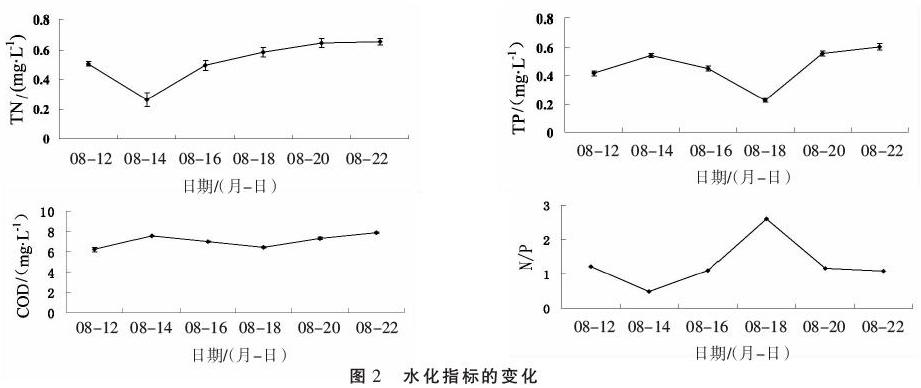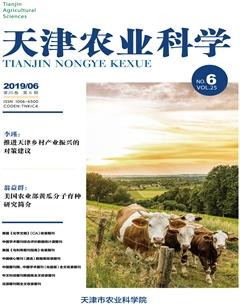养殖尾水循环渠中底泥微囊藻毒素含量与水化指标的相关关系分析
王雪莹 毕相东 董少杰 张树林



摘 要:近年来,随着池塘养殖业的不断发展,富营养化引起的蓝藻水华已成为一个严重的问题,蓝藻水华产生的微囊藻毒素污染因其毒性效应而引起了人们的广泛关注。为研究底泥中微囊藻毒素与关键水化指标间的相关关系,本试验在蓝藻爆发盛期循环水养殖系统的养殖尾水循环渠中,设置3个采样点,每2 d采样1次,共进行10 d,分别分析底泥中微囊藻毒素(MC-RR、MC-LR)含量和水化指标(TN、TP、COD)。结果表明,试验期间水中TN、TP、COD含量的变化范围依次为0.26~0.66,0.23~0.60,6.23~7.86 mg·L-1;MC-RR、MC-LR以及MCs含量的变化范围依次为0.53~0.86,0.01~0.68,0.87~1.34 μg·g-1;MC-RR与TN、TP、COD正相关,与N/P负相关,MC-LR与TN、TP、COD、N/P负相关,MCs与TP正相关,与TN、COD、N/P负相关,其中除MCs与TN相关关系显著(P<0.05)外,其他相关关系均未达显著水平(P>0.05)。
关键词:养殖尾水循环渠;微囊藻毒素;底泥;水化指标
中图分类号:S964.3; S949 文献标识码:A DOI 编码:10.3969/j.issn.1006-6500.2019.06.003
Abstract: In recent years, with the increasing development of pond aquaculture, cyanobacterial blooms caused by eutrophication have become a severe issue, in which the microcystin pollution causing by cyanobacterial blooms has attracted much attention due to their toxic effects. To study the correlations between microcystin content in sediment and key hydration factors of aquaculture tailwater, the experiment was conducted at the peak of cyanobacterial outbreak, three sampling points were set up and sampled once every 2 days for 10 days, the content of microcystin in sediment (MC-RR, MC-LR) and the key hydration factors (TN, TP, COD) were determined. The results showed that the contents of TN, TP and COD in water varied from 0.26 to 0.66 mg·L-1, from 0.23 to 0.60 mg·L-1, and from 6.23 to 7.86 mg·L-1, respectively. The contents of MC-RR, MC-LR and MCs varied from 0.53 to 0.86 μg·g-1, from 0.01 to 0.68 μg·g-1, and from 0.87 to 1.34 μg·g-1, respectively. MC-RR was positively correlated with TN, TP, COD and negatively correlated with N/P, MC-LR was negatively correlated with TN, TP, COD, and N/P, MCs was positively correlated with TP, but negatively correlated with TN, COD, and N/P , in which the correlation between MCs and TN was significant(P<0.05) but other correlations were not significant (P>0.05).
Key words: circulating ditch of aquaculture tail water; microcystin; sediment; hydration indices
近年來,随着养殖水平的不断提高,我国池塘养殖模式不再是单一的“进水渠-养殖池溏-排水渠”的方式,而是逐步向更高效更多元化的养殖形式发展,其中循环水养殖模式就是一种代表。循环水养殖系统是通过一系列水处理单元将养殖池中产生的废水处理后再次循环回用的模式。已有研究报道[1-3],循环水养殖模式有增产、降低氮磷等营养盐含量、降低浮游动植物的生物量等多重优点。当由养殖水体富营养化引起的蓝藻水华[4-5]爆发时,蓝藻门的某些藻类尤其是微囊藻(Microcystis)会向水体中释放大量的微囊藻毒素(microcystins,简称MCs)是蓝藻水华造成的主要危害之一[6]。MCs对水生动物有强烈的毒害作用,可以显著抑制其胚胎发育、生长及繁殖,严重时甚至导致其大规模死亡[7-8]。但目前对MCs含量分布情况主要集中在自然湖泊、河流和池塘养殖中[9-11],对新型的循环水养殖系统中MCs含量变化情况研究甚少。

